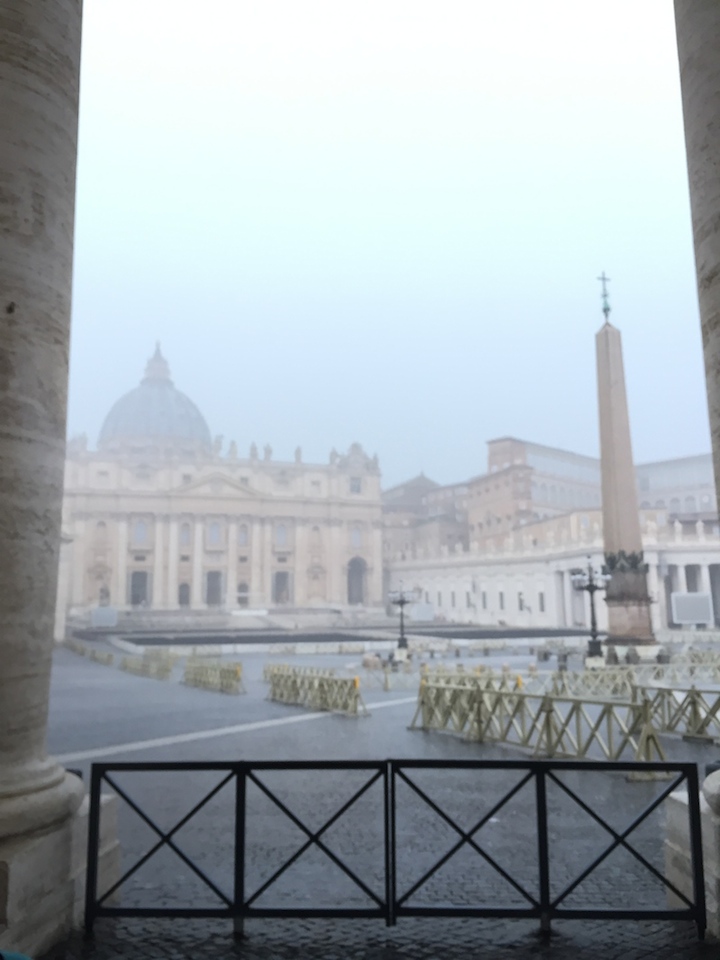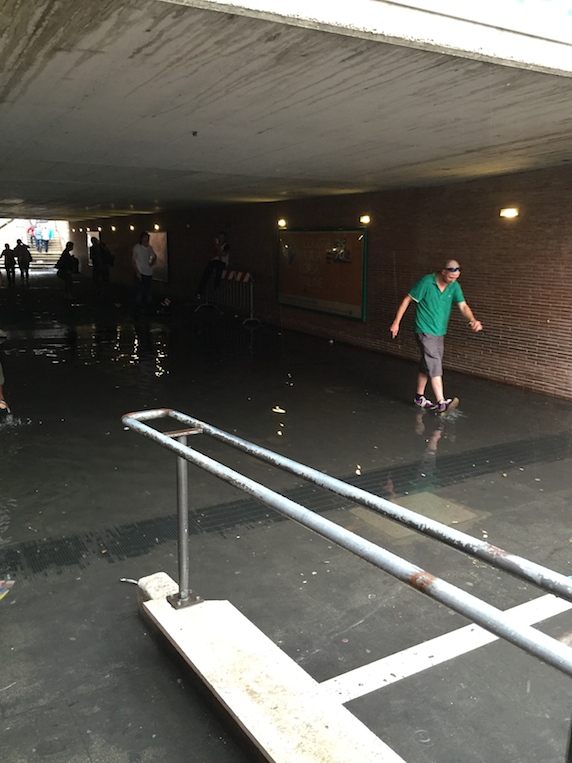September 11, 2016, Sunday — Last Conversations with Pope Benedict
“Peter Seewald: The last question of these last conversations: love is one of your central themes. You dealt with the question of love as a student, as a professor, as a Pope. Where was love in your life? What was your experience: did you feel it, did you experience it, lived with profound feeling? Or did it remain more of a theoretical, philosophical matter?
Emeritus Pope Benedict XVI: No. No, no. If one doesn’t feel love, one cannot even speak about it. I felt love first at home, from my father, my mother, my brother and sister. And then, in fact, I do not wish to descend into private details, but nevertheless I was affected by love, in many dimensions and forms. To be loved and to love others in turn is something I always considered fundamental to be able to live, to accept oneself and others. Over time, I became ever more aware that God Himself is not only, let us say, an omnipotent sovereign, a distant power, but He is love, and He loves me, and in consequence ought to be the compass of my life. And I must allow myself to be guided by Him, by this power we call love.”—Final passage in Ultime Conversazioni (Last Conversations), by Peter Seewald, a volume of previously unpublished conversations between Seewald, a German author, and Emeritus Pope Benedict XVI (p. 226). The date of one of the conversations is given as May 23, 2013 — more than three years ago — and Seewald in his introduction says the conversations occurred both before and just after Benedict’s resignation from the papacy in February 2013. The book has just appeared in Rome in German and Italian editions (on September 9, two days ago). The English edition, to be entitled Last Testament, is expected in November
“Peter Seewald: Which of Mozart’s compositions are your favorites?
Emeritus Pope Benedict XVI: There is a quintet for clarinet that I like very much… Then…. in particular, his Requiem, the first concert that I attended in my life, in Salzburg…”—Ultime Conversazioni (Last Conversations), p. 85.
Conversations with Emeritus Pope Benedict
There has just been a terrific Sunday rainstorm in Rome, including some thunder and lightning, on this 15th anniversary of the September 11 terror attacks in America, commemorated today at “Ground Zero” in New York City.
I went over to the colonnade to watch the rain fall.
In the back of my mind, I was wondering if I might catch a glimpse — and perhaps take a photo — of lightning striking the cupola of St. Peter’s, as it did on February 11, 2013, the day Pope Benedict XVI announced his resignation.
But the lightning today was over other parts of the city, and did not strike the dome of the basilica.
(An empty St. Peter’s Square this afternoon in the rain and mist; the photo was taken from the left colonnade as one looks toward the basilica; the small peaked roof to the right of the basilica in the distance is the roof of the Sistine Chapel, where papal conclaves are held)
The rain left the underpass between via delle Fornaci and the Piazza del Sant’Uffizio — built in the late 1990s to be ready for the crowds during the Great Jubilee of the Year 2000 — flooded with six inches of water.
(Below, a photo of a man getting his shoes wet as he tries to walk through the water-filled underpass; I did not try to cross through the water, but retreated and went the old way, over the top of the underpass, in front of the galleria)
I was carrying a book I bought yesterday at the Leoniana bookstore, which is located on the street in back of the Holy See Press Office.
While there, I briefly greeted the shop’s aging owner, don Gino Belleri, who has worked around the Vatican since the 1960s.
“Don Gino, how are you?” I asked him.
“As well as can be expected,” he replied, then reached into his memory to recite a Latin maxim. “‘Senectus insanabilis morbus est.’ Seneca: ‘Old age is itself an incurable disease.’ Terence says something similar: ‘Senectus ipsa morbus est‘ — ‘old age is itself a disease…'”
I nodded.
“I understand,” I said. “How old are you now?”
“Eighty-eight,” he said.
“Almost the same age as my father, who just turned 90,” I said. “And almost the same as Emeritus Pope Benedict… he will be 90 in the spring.”
The book I had purchased from don Gino is entitled Ultime Conversazioni (“Last Conversations”).
It contains the transcripts of several extraordinary conversations between the German author Peter Seewald and Emeritus Pope Benedict XVI.
I bought the Italian text — the English edition is still in preparation, and is expected in November.
As the rain fell, and as the colonnade grew crowded with pilgrims and tourists trying to keep out of the downpour (see below — you can see the shower of rain off of the roof of the colonnade against the yellow of the building in the background), I found a place out of the rain where I could watch for lightning bolts, and began to thumb through this little book.
As I read, it seemed I could almost hear the old Pope’s voice again, echoing in my ears.
The words took on deeper meaning for me since I had recently traveled to Germany and visited the towns where Benedict lived as a boy — where there are moving exhibits of old family pictures, especially in Marktl-am-Inn, where Joseph Ratzinger was born and lived his first two years — and the church in Freising where he was ordained a priest 65 years ago, in 1951, at the age of 24. (For an account of that travel, see this report by Deborah Lubov, who accompanied us, along with Dr. Michael Hesemann, on our Inside the Vatican “Pilgrimage in the Footsteps of Pope Benedict XVI” in the first days of July.)
So when Seewald asked about Benedict’s father and mother, and about his childhood in Traunstein and other Bavarian towns, it seemed I was seeing those people and places once again through the old Pope’s eyes.
And I knew the old Pope’s voice well, not only because of listening to many of his public discourses during his papacy from 2005 to 2013, but also because I had met him personally in 1984 and had a number of long conversations with him in the 1980s, 1990s and early 2000s.
In those conversations, which I drew on in my book on the new Pope after his election in 2005, Let God’s Light Shine Forth: The Life and Spiritual Vision of Pope Benedict XVI (Random House, 2005, link), I sought to understand the man, his life, his mind, his faith.
And as I read the questions of Seewald and the answers of Emeritus Pope Benedict, I felt again and again that the Emeritus Pope was offering thoughtful insights into our present predicament in the Church and in the world, and into the reasons for his own actions as Pope, insights that seemed important to share widely.
So I thumbed through these pages with deep interest, and felt that a wider public, first in the Catholic Church, but then also in the wider world, ought to be made aware of what this old man, now almost hidden from the world, except on rare occasions and in brief appearances, has to say in the pages of this slim but precious and important volume.
The book begins with questions about the former Pope’s life since his resignation. Evidently, these questions were asked, and answered, on May 23, 2013, just a little more than two months after the election of Pope Francis on March 13, 2013.
Seewald asks Benedict, first of all, if he misses being Pope.
Benedict replies no, that, on the contrary, “I thank God that there no longer falls to me a responsibility that I was no longer in a condition to bear.”
And so, from the very opening of the book, the former Pope is clear: he resigned because he felt he was no longer able to bear the responsibility of being Pope.
In these passages, Benedict tells Seewald what he saw as his main task as Pope: “I was aware that my task was… to seek to show what the faith means in today’s world, to focus again on the centrality of faith in God and to give to men and women the courage to believe, the courage to live the faith in this world in a concrete way.”
Seewald asks Benedict, trained as a theologian and professor, if he had not wished to leave his ecclesial posts, to be “just a man” instead of a high-ranking Church leader charged with carrying out “an infinity of duties.”
Benedict replies that, yes, he did feel that way, especially when he was the Cardinal Prefect of the Congregation for the Doctrine of the Faith. “I told this often to John Paul II. But he always replied: ‘No. You continue forward.'”
Seewald asks Benedict if he had thought about not accepting his election as Pope in 2005.
Benedict tells him that this was for him “a very serious question,” suggesting that he did, indeed, consider the possibility of not accepting, at least momentarily.
“Nevertheless,” Benedict says, “it struck me that during the pre-conclave period, many cardinals, as it were, implored the one who would be elected to take upon himself the cross even if he did not feel adequate to the task, to bend himself to the vote of the two-thirds majority and to see in that vote a sign.”
So, Benedict says, the cardinals had convinced him that the vote was an expression of the choice of the Lord, “and I had to accept.”
(to be continued)
Note: The Moynihan Letters go to some 20,000 people around the world. If you would like to subscribe, click here to sign up for free. Also, if you would like to subscribe to our print magazine, Inside the Vatican, please do so! It would support the old technology of print and paper, as well as this newsflash. Click here.
What is the glory of God?
“The glory of God is man alive; but the life of man is the vision of God.” —St. Irenaeus of Lyons, in the territory of France, in his great work Against All Heresies, written c. 180 A.D.










Facebook Comments